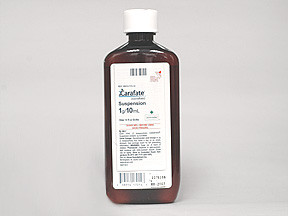SUCRALFATE SUSPENSION - ORAL
PHONETIC PRONUNCIATION: (sue-KRAL-fate)
COMMON BRAND NAME(S): Carafate
GENERIC NAME(S): sucralfate
Uses
USES: This medication is used to treat ulcers in the intestines. Sucralfate forms a coating over ulcers, protecting the area from further injury. This helps ulcers heal more quickly.
How to use SUCRALFATE SUSPENSION - ORAL
HOW TO USE: Shake the bottle well before each dose. Take this medicine by mouth, usually 2 teaspoonfuls 4 times daily, on an empty stomach at least 1 hour before a meal, or as directed by your doctor. The dosage is based on your medical condition and response to therapy. Use this medication regularly in order to get the most benefit from it. To help you remember, use it at the same times each day. It is important to continue taking this medication even if you do not feel ulcer pain. Do not stop taking this medication without consulting your doctor. It may take 4 to 8 weeks for your ulcer to heal completely. Some medications may not work as well if you take them at the same time as sucralfate. They may need to be taken at a different time of the day than the time you take sucralfate. Ask your doctor or pharmacist for help making a dosing schedule that will work with all your medications. Antacids can be used with this medicine, but they should be taken at least 30 minutes before or after sucralfate. Inform your doctor if your condition persists or worsens after you have been taking sucralfate for 4 weeks.
Side Effects
Precautions
Interactions
Overdose
Images
Reviews
Faq for SUCRALFATE SUSPENSION - ORAL
Sucralfate Suspension is used to treat and prevent ulcers in the stomach and intestines.
Sucralfate forms a protective coating over ulcers, helping to heal them and prevent further damage.
Take Sucralfate Suspension on an empty stomach, typically one hour before meals or two hours after meals. Shake the bottle well before each dose and use a special measuring spoon or device to ensure accurate dosage.
Common side effects may include constipation, diarrhea, upset stomach, and flatulence. These side effects are usually mild and temporary.
Sucralfate may interact with certain medications, including antacids, vitamins, and antibiotics. It is important to inform your doctor or pharmacist about all the medications you are taking to avoid potential interactions.
Sucralfate may take several days to a few weeks to show its full effects. It is important to continue taking the medication as prescribed, even if you start feeling better.
It is best to avoid alcohol while taking Sucralfate Suspension, as it may increase the risk of stomach irritation and worsen certain side effects.
It is important to consult your doctor before using Sucralfate Suspension if you are pregnant or breastfeeding. They will assess the potential risks and benefits and determine if it is safe for you to use.
If you miss a dose, take it as soon as you remember. However, if it is almost time for your next dose, skip the missed dose and continue with your regular dosing schedule. Do not take a double dose to make up for the missed one.
Disclaimer
IMPORTANT: HOW TO USE THIS INFORMATION: This is a summary and does NOT have all possible information about this product. This information does not assure that this product is safe, effective, or appropriate for you. This information is not individual medical advice and does not substitute for the advice of your health care professional. Always ask your health care professional for complete information about this product and your specific health needs.


No Reviews Yet